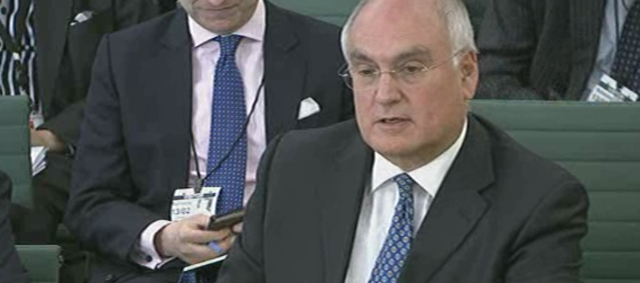Ofsted boss Sir Michael Wilshaw has clashed with the Association of Colleges (AoC) over the issue of failing colleges after claiming there was no “consequence for failure in the FE sector”.
Flanked by his learning and skills director, Mathew Coffey, Sir Michael told members of the education select committee that the system for failing schools was different to that faced by colleges.
“I think one of the reasons why schools are improving their performance but colleges aren’t, is that there are very clear consequences to failure and underperformance in the schools sector,” he said, having revealed plans for a new ‘excellent’ grade in leadership.
“If a school becomes inadequate and remains so, the head usually goes, something usually happens to the governing board … etc.
“We don’t sense there’s that same sense of clear consequence for failure in the FE sector and that’s where both the Department for Education and Business, Innovation and Skills have got to take action.”
Sir Michael’s claim drew a swift response from Joy Mercer, AoC’s director of policy.
“We would challenge those statements which appear to be unsupported by evidence,” she said.
“The consequences for failure in a college, for instance, are comparable to schools — governing bodies regularly hold senior management teams to account for performance.”
The Ofsted duo were giving evidence on a number of issues from Ofsted’s annual report last year that was highly critical of colleges.
“With this report I tried to make it clear that schools are getting better but not as quickly as they should do and there’s a real problem in learning and skills,” said Sir Michael.
Ofsted has itself come in for criticism for targeting poor colleges with a ‘risk-based approach,’ but took the opportunity to defend itself at yesterday’s (Wednesday, February 13) hearing.
“In learning and skills we adopt the proportionate inspection approach, and this year about a third of all our learning and skill inspections were brought forward on the basis of the risk we felt they posed to us,” said Mr Coffey.
“For colleges as part of that cohort it was more like 55 per cent. It’s right to target our resources where they’re most needed, particularly when the cohort of people studying are only studying for a relatively short period of time, one or two years, so we can’t wait for crisis point.”
But the AoC’s Ms Mercer hit back again.
“We need to remember 64 per cent of colleges are graded outstanding or good from their last inspection, but neither AoC nor its members are complacent,” she said.
“The annual report no longer represents a state-of-the-nation view, nor does it provide a reliable year-on-year comparison. For example, last year 44 per cent of college inspections were conducted on a risk assessed basis — as opposed to 34 per cent in schools — meaning that a skewed sample of colleges was inspected.”
Sir Michael Wilshaw, HM chief inspector, Ofsted
Nevertheless, Sir Michael won Ms Mercer’s approval with plans to bring school careers guidance under the inspection remit, but reiterated fears that college principals had lost focus on the quality of teaching.
“It’s really important that impartial advice is given to students on progression routes and I’m not sure that’s the case,” he said.
“In our adjustment to our inspection framework from September we will give the inspection of careers advice a priority.”
He added: “Getting principals of colleges to focus on what’s important is absolutely critical. They lost their way a bit and focussed on capital investment, extending their reach, building programmes, going abroad to attract students and so on.
“All those things are important, but equally, if not more important is what’s happening in the workshop or the classroom — as an eminent ex-principle said to me ‘they need to start worrying more about what’s happening in Deptford rather than Delhi’.”
Meanwhile, just days after an FE Week special investigation into tumbling inspection grades at London colleges, Mr Coffey revealed fears about the capital’s FE institutions failing.
“There is an urban college issue, particularly a London college issue and we have seen some decline in inspection grades in London,” he said.
Matthew Coffey, Ofsted director of learning and skills
And with a government announcement on the funding of Local Enterprise Partnerships (LEPs) next month expected to include a single pot of cash taking in the adult skills budget, Mr Coffey said he wanted to see FE representation on LEP boards.
He also expressed fears the FE sector was not ready for the raising of the participation age (RPA), and that funding problems had been “at the heart” of many college problems.
Mr Coffey said: “Given what we’ve said in the annual report about key challenges, essentially about insufficient good quality teaching, some concerns about teaching of English and maths at level two, we are concerned about the preparedness of the sector to be able to take on board what essentially will equate to another 250,000 students by 2015.”
He added: “Funding has been at the heart of many problems we’ve identified and the report does pose the question ‘is the system fit for purpose?’ Its main reference point is the financial incentives have all been wrong; they’ve led to very low level qualifications being delivered across the board to a wide number of students.
“For example alcohol awareness and personal effectiveness — because they’re funded and because it delivers the money, but what chasing this money has done, is taken the leadership’s eye off the ball of what really matters, which is teaching and learning.”
The AoC’s Ms Mercer said: “We welcome Ofsted’s recognition that a lack of stability in the system caused by colleges having to chase funding year to year has been at the root of many of the problems the report identified and that perverse funding incentives need to be addressed.”









Sir Michael is inaccurate. Whilst there may not be a system for replacing Principals of colleges judged inadequate, in my experience, very often resignation and replacement follow swiftly. Indeed the life of a Principal can be ‘nasty, brutish and short’. Whilst there can be no room for complacency, since it’s my belief that there is always room for improvement, and college leadership teams need to have a primary focus on teaching and learning, providing that the management capacity and capability is there, then College’s should seek out opportunities both commercial and otherwise. This is particularly the case now as the public purse shrinks and is likely to continue to do so. Sir Michael has a great track record of improvement, and one of which I would be proud, but in my opinion his comments are narrow, ill informed, albeit motivated by a sincere determination to improve provision for students across the learning network.
As ever, there will be some good and some bad in this situation – not all colleges can be tarred with the same brush. It’s ironic that an organisation that inspects providers for how well they differentiate and meet individual needs appears to be falling into a trap of over-generalising limited findings and then stereotyping…
What about LSIS?
LSIS run a recovery service to support failing colleges. Why on earth are they getting rid of such a valued service?
The new FE Guild won’t be picking this up and the staff are being made redundant!